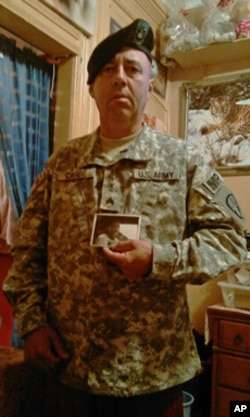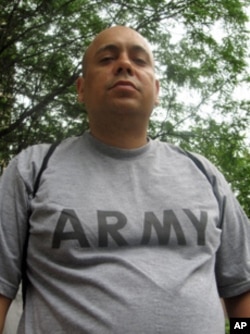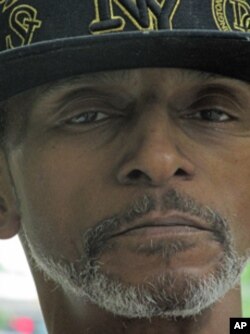Monday, May 31 is Memorial Day in the United States, a time when Americans traditionally take time to honor those who have died in the nation's wars.
While Memorial Day is often celebrated with flag-waving and patriotic ceremonies and parades, it can also be a highly personal observance: a time to grieve for comrades-in-arms and others who have lost their lives in military service.
Remembering the fallen
It is noon outside the Veteran's Administration hospital in Midtown Manhattan, and the usual lunchtime crowd is here: health care workers in loose green scrubs, family members with bouquets and Mylar balloons on the way to visit patients, and veterans, like Bill Joseph.
He takes a bite of a hot dog, adjusts his Veteran of Foreign Wars cap, and recalls his experience in the U.S. Navy during the Vietnam War more than three decades ago.
"The person I most fondly remember is Cmdr. Bill Searfus, who became like a close friend," says Joseph. "Although he was a commander, everybody wanted to be there for him. He was compassionate. He gave a damn about his men."
Cmdr. Searfus' plane was shot down over Hanoi, North Vietnam's capital. "They blew his canopy off and he almost made it back to the ship and he went under," recalls Joseph. "It was very, very traumatic for me - more than if he got killed - because he almost made it back to our ship safely."
Marco Torres mourns three men in his squad, who were killed in a road ambush near Kabul, Afghanistan.
One of those men, Sgt. McKay, was like a big brother to him. "When I had problems…he'd always lend an ear, and being that he was of age, he had a lot of experience."
Torres was flattered that McKay revealed a bit of his own life to him. "He was a parent. He was a marathon bike runner. He was a business owner of a garage and he was real tight with his family. He liked what he did."
Torres recalls the cheerful personality of another fellow squad member named Palmateer, who was killed in the same ambush.
"He was always trying to get the guys motivated and… he was just always funny. We always had a blast."
When asked whether he would be remembering his fallen comrades-in arms this Memorial Day, he nodded sadly "Yeah, them and a lot of other guys."
To hear many vets tell it, compassion and kindness co-exist with courage and grit on the battlefield.
Sgt. Carde, who was wounded in Iraq, is at the VA hospital today being treated for depression following the death of a dear comrade. "This guy…tried to do something for the unit. He gave me coffee in the morning. He took care of the soldiers."
Carde says he doesn't expect to ever meet another person who will equal that man's kindness and vows never to forget him, or the honorable way he died in combat.
"I've got a picture of him of him in my living room. Every time I go out, I salute him."
Nameless comrades in arms
Some vets carry powerful memories of a fallen soldier they never knew.
Veteran Michael Andre thinks back to 1968 and a fellow soldier caught up in battle during North Vietnam's Tet Offensive.
"It was ugly," says Andre. "There was the big black guy. He was wounded… and on his knees still fighting. All he had left was his sidearm. I remember him to this day. He didn't go out like a chump. He's what you call a real hero."
The Vietnam War has been over for decades. Many of the distinctions between "friend" and "enemy," "us" and "them" that once seemed so critical have lost their edge and relevance for some.
For Ronnie Barnes, a jungle fighter who saw more than his share of death, the most vivid memory is holding the limp body of the anonymous Viet Cong soldier he had just killed with a long blade knife.
"I cut his throat and I just stood there holding him, frozen." Barnes says he was forced to snap out of his trance by a punch by his sergeant, who order him to "wake up" and put the corpse down.
"It's not easy to kill people like it is in the movies." Barnes says the experience stays with him today."Every day of my life. It never goes away. It doesn't mean I'm traumatized by it. I don't know. Maybe I am."
The late Argentinean writer Jose Narosky once said, "In war, there are no unwounded soldiers."
By remembering those who died in battle - as well as those with wounds that never heal - Americans honor them, and acknowledge their service.






